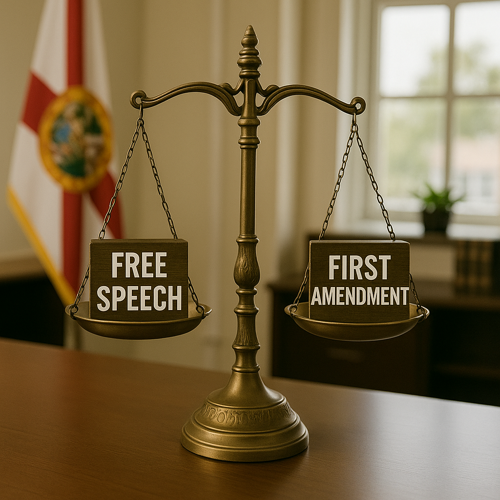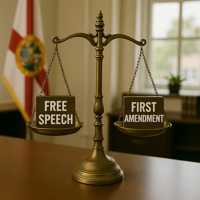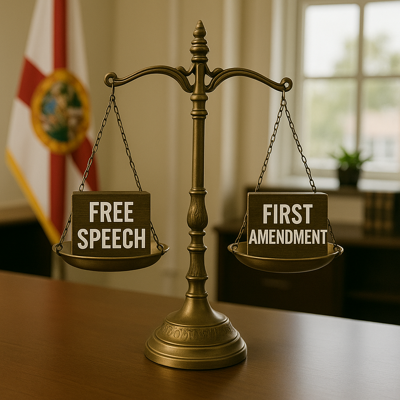After conservative influencer Charlie Kirk, 31, was shot and killed Sept. 10, his views on guns, religion and other issues became the subject of widespread discussion. A growing number of people, from Lee County schoolteachers to national talk show host Jimmy Kimmel, have faced discipline for sharing their opinions.
In the days after Kirk’s death, Fort Myers employment attorney Scott Atwood fielded queries from employers and employees regarding the legal rights surrounding free speech in the workplace. Atwood is chair of the Labor and Employment Law Group with Henderson, Franklin, Starnes & Holt P.A.
Americans are accustomed to First Amendment protections against government restrictions on free speech, but those protections do not extend to private, nongovernment employers and employees, Atwood said. Public employees have some First Amendment safeguards, though they are far weaker than the rights granted to citizens in general.
On Sept. 12, Atwood responded to recent queries with an article available on Henderson Franklin’s website, titled “What Florida employers need to know about free speech in the workplace.”

Scott Atwood, chair of the Labor and Employment Law Group with Henderson, Franklin, Starnes & Holt P.A., advises employers and workers on free speech protections in the workplace.
Along with his advice for employers, he shared his perspective on the unfolding conversation surrounding speech in the workplace and how it might apply to local teachers who are being investigated for comments they made about Kirk on social media. Over more than three decades in practice, Atwood has advised businesses, schools and other public entities on employment law matters, such as workplace communication policies.
Public employees, typically, those who work for any agency subject to The Florida Sunshine Law, have limited First Amendment rights if they are speaking about “matters of public concern,” Atwood explained. The 2006 Supreme Court case Garcetti v. Ceballos is a landmark decision that weakened First Amendment rights for public employees, shrinking protections to speech that is not related to their job.
“If it’s about personal interest to you about your job you have less protection,” Atwood said, such as an accountant speaking about monetary waste at their company. “But if you are talking about, say Charlie Kirk, and you are hypothetically a teacher that may hypothetically give you First Amendment protection.”
But teachers also face a higher ethical code, he adds. “Teachers are supposed to act above reproach. So, targeting people who are dying may not be an appropriate response,” he said.
Whether or not that employee can legally be disciplined or fired for their speech may come down to how what they say is perceived by their employer and the public.
“It’s all about the presentation of your opposition or speech,” Atwood said. “If your speech is hateful and promoting violence and not measured then it may not pass the First Amendment protection test.”
The American Civil Liberties Union of Florida suggested that public employees, so long as they do not condone or encourage violence, should be protected from retaliation by government leaders. Florida Department of Education Commissioner Anastasios Kamoutsas and Gov. Ron DeSantis made statements that support disciplining teachers for comments they made about Kirk.

Huxley Lambertson hugs her mother, Keslyn Lambertson as they visit a makeshift memorial for Charlie Kirk outside of the headquarters of Turning Point USA on September 16, 2025, in Phoenix. Kirk, the CEO and co-founder of Turning Point USA, was shot and killed on Sept. 10 while speaking at an event for his "American Comeback Tour" at Utah Valley University.
“Government actors calling for people to lose their jobs and livelihoods because they exercised their right to freely express political views that are controversial — a right Kirk himself exercised and encouraged for others — is alarming,” ACLU officials said.
Private, nongovernment employers have even more leeway to discipline employees for their speech. That is in part because Florida is an at-will employment state, meaning workers can legally be fired or choose to leave their jobs without any reason or notice. As Atwood writes, “Private employees have no First Amendment rights in the workplace.”
However, they do have some limited free speech protections under the 1964 Civil Rights Act and other related laws. That includes claims or speech made in good faith that focus on race, gender, religion, national origin, age, disability and military status. Employers also might be obligated to act if speech targets people based on those protected characteristics. The National Labor Relations Act also provides some protection for speech related to workplace conditions.
Employers often allow their workers to speak as they wish, Atwood said, unless their comments are viewed in some way as an impediment to business, hurt a company’s reputation or create a hostile work environment. He advises employers to clearly define procedures used to address complaints about speech and to do so with “both care and consistency.”








(0) comments
Welcome to the discussion.
Log In
Keep it Clean. Please avoid obscene, vulgar, lewd, racist or sexually-oriented language.
PLEASE TURN OFF YOUR CAPS LOCK.
Don't Threaten. Threats of harming another person will not be tolerated.
Be Truthful. Don't knowingly lie about anyone or anything.
Be Nice. No racism, sexism or any sort of -ism that is degrading to another person.
Be Proactive. Use the 'Report' link on each comment to let us know of abusive posts.
Share with Us. We'd love to hear eyewitness accounts, the history behind an article.